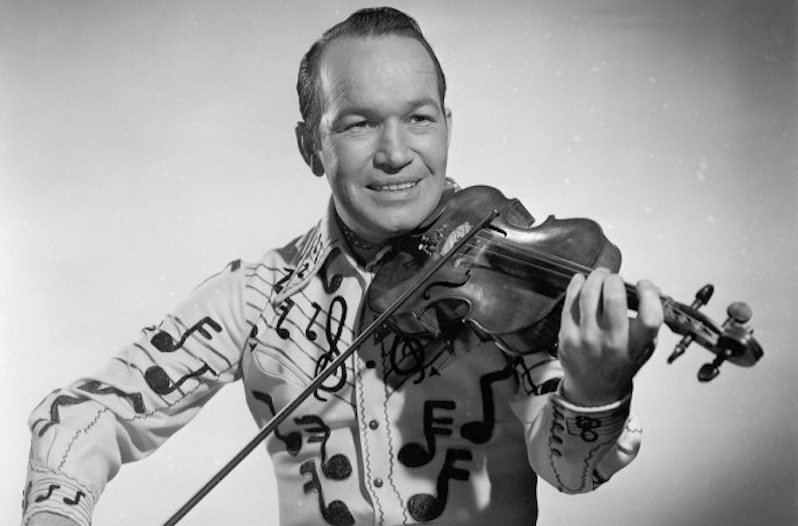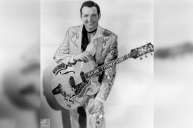Few country stars experienced the extremes of fame like Spade Cooley. His passions fortified him as an immensely talented and ambitious star. However, they also revealed him as a murderous monster.
Videos by Wide Open Country
Born to a poor Oklahoma family in 1910, Donnell Clyde Cooley established himself as a fiddle virtuoso at a young age. He watched his father earn money as a fiddler at local dances. Those early memories ultimately inspired his decision to play fiddle too, especially because he had no money for classical instrument lessons.
His family moved to Oregon around 1930 during the Dust Bowl, like many other Americans. Naturally, this kinship with other displaced Dust Bowlers helped earn Cooley a reputation as a fiddler of the people.
A Promising Career
Since he was one-quarter Cherokee, Cooley enrolled in Chimewa India School. Although he originally started out as a cellist, Cooley switched to violin during his high school years. He always had a hot head for rash decisions. So, at age 17, he married a classmate named Ann and ran away to California with their newborn son.
At some point along the way, Cooley earned the nickname "Spade" during a poker game. The name stuck after he apparently won several hands with a serious of flushes, all spades.
Eventually, Spade and his new family settled in Los Angeles and landed the management help of Bobbi Bennett. Under Bennett's tutelage, Cooley became a regular performer down at the Santa Monica Venice Pier Ballroom. He also began acting, first as a small role player and even a stand-in for Roy Rogers, whom he resembled.
By the early 1940s, Cooley's electric Western swing performances — featuring footwork inspired by his days as an amateur boxer — captivated weekly audiences in the thousands. He landed a record-breaking 18-month engagement at the pier ballroom. In an attempt to mirror the success of Bob Wills, Cooley hired Tex Williams. Williams had a similarly smooth, sultry voice to Tommy Duncan, who sang as part of Bob Wills' Texas Playboys.
The term "Western swing" has its origins with Spade Cooley, though historians to this day disagree on whether it was first truly associated. Cooley's promoter started referring to his music as "Western Swing" in 1942.
In 1945, Cooley had a No. 1 hit with "Shame On You" (an ironically autobiographical title), which topped the charts for an astounding two full months. It also set off six straight top 10 singles. His career ballooned, much like his ego.
Calling a Spade a Spade
Cooley was a womanizer. His manager Bennett, in an unpublished manuscript, claimed she paid 10 women whom Cooley had an affair with to have abortions — in one year alone. When his eye caught sight of Ella Mae Evans, Cooley used his position as band leader to bring her in.
The attractive singer had big aspirations, and Cooley, who led a 30-piece band, gave her the spotlight as a featured singer. He eventually divorced his first wife Ann to marry Ella Mae.
Cooley was also extremely insecure. No matter how much success he had, Cooley felt an intense rivalry with Bob Wills. When Wills and his Texas Playboys made their way over to Los Angeles, a promoter bumped Cooley and his orchestra for Wills. Incensed, Cooley demanded that he book them both as a "Battle of the Bands." During the performance, Cooley insulted Wills multiple times, often playing Wills' signature songs. Afterward, he crowned himself the "King of Western Swing."
Of course, most people nowadays still recognize Bob Wills as the "King of Western Swing," a fact that no doubt has Cooley jealously rolling in his grave.
As the 40s turned over into the 50s, Cooley landed a variety show called The Hoffman Hayride. It proved to be one of the most popular shows in all of the Los Angeles area, lasting 10 years.
But as the 50s inched towards the 60s, Western-swing was losing its footing as America's most beloved music to the likes of rock n' rollers like Buddy Holly and Elvis Presley. Cooley found himself looking for alternative means of making money, including an ill-fated attempt at building a Disney-like waterpark in the middle of the Mojave Desert, where he relocated his family, which now included a son, Donnell Jr., and a daughter, Melody.
A Brutal Murder
In 1959, Cooley's television show was cancelled. Throughout his career, he was known to imbibe and go off the drunken deep end. Sometimes the victims were his bandmates, who'd drunkenly fire and then apologetically seek out the next day. Other times, they were his family. Most notably, Ella Mae took the brunt of his abusive, cowardly attacks.
At one point, Ella Mae entered into a hospital after one of Cooley's vicious abusive episodes. She pleaded not to be released by the hospital for fear of her life. In March 1961, Ella Mae and Spade Cooley filed for divorce. Cooley had long been suspicious of Ella's infidelity, though Ella plainly knew of Spade's own affairs. She reportedly told a friend she had slept with Roy Rogers in the early fifties, and Cooley also jealously and wrongly assumed she was having an affair with two men (who turned out to be gay).
On April 3, Cooley took Ella Mae to see her parents at her request. It was a "last wish" of sorts, as hours later she would fall victim to Cooley's final violent outburst. When he took her back to their Willow Springs home, he began beating and torturing her for hours. At one point, he put out a cigarette on her knee to determine if she was dead or faking it. He sat for hours in bloody clothes before eventually calling for an ambulance.
Trial Of The Century
Cooley's 14-year-old daughter Melody witnessed much of the attack, and her courtroom testimony helped put him behind bars. The trial was a spectacle, much like the O.J. Simpson trial that would take place 30 years later. Gruesome details about Ella Mae's death spellbound witnesses who waited for hours to get a seat in the courtroom. During one point in the trial, it was even revealed that Cooley had sexual abused his daughter Melody.
Oddly enough, Cooley's celebrity still granted him sway and favor. His time behind bars during the trial rarely seemed like a prison, as he routinely walked the halls and ate with the guards.
According to the files of Leonard Winters, a detective who worked closely with attorneys in the case, many in the court wondered why Cooley wouldn't enter a plea of not guilty by insanity. Given the disgustingly lenient attitudes towards spousal abuse at the time and his fame, most people assumed he'd receive the verdict. But in papers later discovered by The Californian, Winters revealed private psychological testimony showing Cooley feared he was a closeted homosexual.
The trial lasted just over a month. It took the jury a little over 19 hours to render Spade Cooley guilty of first degree murder and on all counts. In one of the strangest scenes surely of any courtroom, much of the jury openly wept when issuing the verdict. Grown men and women hugged and even kissed Cooley.
Karma Claims Cooley
In 1968, only 7 years into his life sentence for the murder of his wife, Cooley received unanimous votes granting his parole from Vacaville in 1970. Cooley had suffered a heart attack years earlier, and his declining health combined with nostalgic popularity certainly gave him the upper hand. As a show of thanks, he agreed to perform a charity function in Oakland in November 1969.
Cooley performed the first half of his show to a rousing standing ovation. As he walked offstage for intermission, Cooley suffered his second heart attack and died on the spot. He was scheduled to walk free in less than 4 months.
Spade Cooley remains largely forgotten in the world of Western swing, thanks to his dark demons. A promising career gave hope to thousands of Americans born similarly into poverty and searching for a way out. He achieved success in music, film and television. But nowadays, his legacy mostly revolves around his violent temper and jealousy.
To this day, he remains the only convicted killer with a star on the Hollywood Walk of Fame — an honor he received merely months before the brutal murder that now defines his life.




